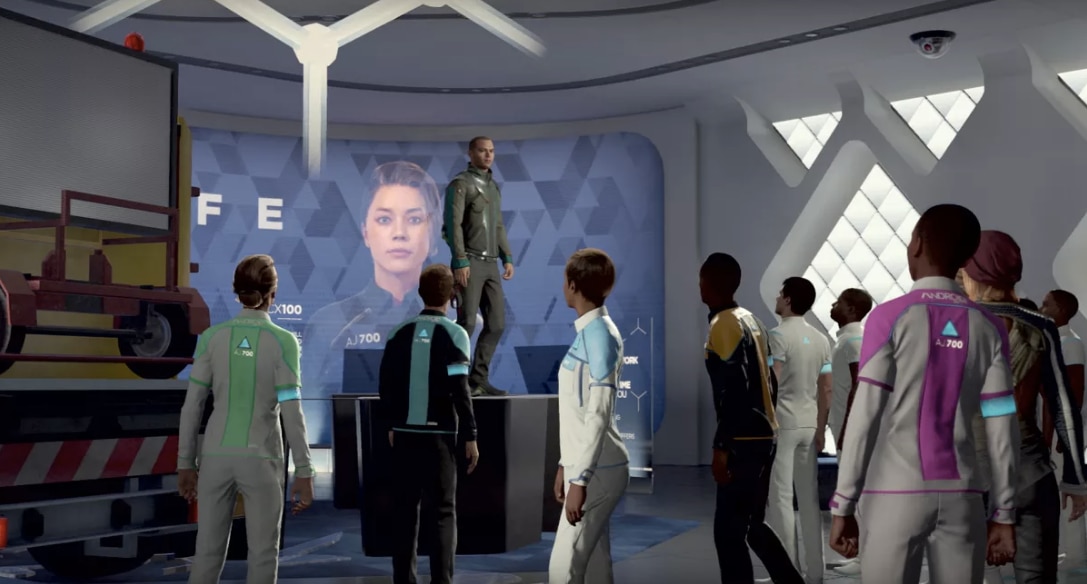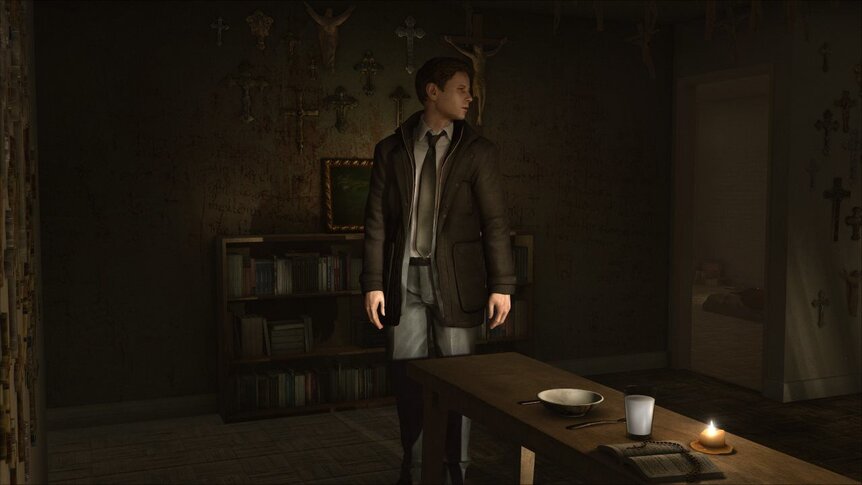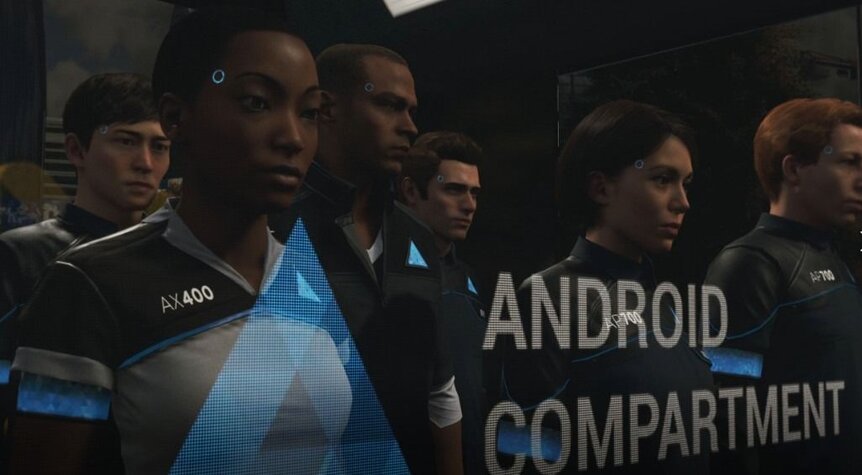Create a free profile to get unlimited access to exclusive videos, sweepstakes, and more!
Loving David Cage's games, flaws and all

As a fan of narrative-based games, with big dramatic cutscenes and choices about how plots should play out, I’m a really big fan of the video games made by director David Cage and his studio Quantic Dream.
Initially a PlayStation exclusive developer, but now also publishing games to PC, Quantic Dream focuses on making games about mystery, consequence, and moral quandaries. The studio’s releases range from Heavy Rain, a thrilling tale of a father going through hell trying to save his missing son from a killer while being framed for the crime himself, to Beyond: Two Souls and its story of a young girl trying to live while tethered to a verified supernatural entity, to, most recently, Detroit: Become Human and its dramatic take on the emergence of self-aware androids. These games all pose the player with choices that can lead to player deaths, entirely new scenes, and different endings to your story.
I love the games that David Cage and Quantic Dream make, but I’ll also be the first to admit that they’re objectively ... a bit crap.
Heavy Rain is a truly interesting mix between a detective thriller and a Saw-style horror experience. The game follows father Ethan Mars, who, after the death of his youngest son, tries to rescue his remaining child from a killer intent on testing his love as a father. Following the case from the perspective of a private detective, a journalist, an FBI agent, as well as the father, we play through the story of a man willing to go to difficult and extremely dangerous lengths to hopefully save one of his kids after he failed to save the other.
It’s an emotionally charged narrative, with some truly heartwarming moments and some action scenes I love. It also features some terrible voice lines and severe narrative railroading, and at multiple points actively lies to the player in order to hide the identity of its criminal. There are literal scenes where things are meant to have occurred just outside of shot, and there is simply no time for them to happen.
Additionally, there are plot threads in the game that were changed late in development without the hints at them being removed, leading to a highly disjointed narrative. At one point the main character was meant to be psychic, a plot point cut out so poorly it leaves a handful of unexplained red herrings throughout the mystery if you stop to think for too long. It’s a game with some major issues, to put it mildly.
Beyond: Two Souls tells the story of Jodie, a young girl played by Ellen Page, who is born with a supernatural spirit connected to her by an invisible tether. After being abandoned by her parents and raised by a government facility, Jodie tries to walk the line between living a normal life and being a military guinea pig monitored at all times.
At its peak, the game has some truly powerful moments. Page and Willem Dafoe lend some amazing performances to the narrative, and a number of isolated scenes make exceptionally interesting mechanical use of playing as a soldier with an invisible weapon. Page’s portrayal of a teenage girl who feels trapped and just wants to be normal is fascinating, and the villain’s motivations are really interesting.
There’s one section in particular where Page’s character is living on the street, busking and on the run from the CIA. This entire section of the game is pretty fantastic, with a haunting busking performance, and one powerful optional moment where you can have the main character try to end their own life, only to be stopped by the invisible entity tethered to them and breaking down in frustration at her own lack of agency in such a tough emotional climax. As someone who has tried to end my own life, and been prevented, while I am incredibly thankful in the long term, I can totally recognize the very human distress that results in.
It’s also incredibly linear for a game designed to be choice-based and told in a weird nonlinear format, which adds nothing to the plot other than to tell you in advance certain characters will still be alive no matter what you’ve done until then, and many of its scenes are ludicrous caricatures of human interaction. This is a recurring problem for Cage's games.
The studio’s most recent game, Detroit: Become Human, follows the stories of three androids, who all manage to break free of their core programming and gain a degree of autonomous behavior. You follow the stories of a housework robot who saves a young girl from an abusive father, a robot blamed for the murder of its loving owner, and a police detective robot as they all try to find safety, freedom, and answers regarding how they came to exist.
At its best, Detroit poses some really tough questions to players about morality. If you’re out in the cold and rain with a kid, do you steal someone’s clothes from the laundromat to help them get warm and dry? Do you sleep in an abandoned car, or steal money to get into a motel? Choices like these do feel very real and evoke undeniable emotional responses.
Playing through an interactive civil rights protest can be a powerful thing, asking questions about how much or little you would view androids as human is handled in interesting ways, and the partnership between our detective android and his reluctant human partner can blossom into something beautiful if you make the right choices.
But on the other hand, Detroit is an incredibly ham-fisted allegory for the Black civil rights movement, with Black people simply replaced with robots. Right near the beginning, you see androids placed in a compartment at the back of the bus, you can post literal civil rights slogans on walls, and at times it does just feel incredibly tone-deaf for the story not to acknowledge the real-world struggle its plot is clearly taking its talking points directly from.
Oh, and they throw in literal concentration camps, just in case you still hadn’t figured out that this was an allegory for what we have put humans through as a species in the past. It's unapologetically about slaves demanding rights and to be seen as living beings, about minority groups getting equal footing in society, and about the genocide of minority groups painted as dangerous, but it practically never addresses that these are themes present in real-world history.
Nothing in Detroit is handled with subtlety, and certain railroaded scenes are telegraphed so far ahead of time that I found myself knowing something bad was going to happen, but not being able to walk away.
Still, I love all of these kinds of crappy games. I acknowledge their flaws, and I am aware there are allegations of some pretty sh*tty behavior at the company that makes them, but they’re also somewhat one of a kind. There’s not much in the way of interactive choice-based big-budget games these days, particularly ones that shoot this ambitiously high with their plots. Sure, they may not stick the landing, but they are nothing if not ambitious.
For a few years, we had Telltale making games like this on a smaller budget, but they have since shut down. The Life Is Strange series still exists, but it’s one smaller-budget example that takes forever to release new episodes. If you’re into horror experiences there are Supermassive games and their titles like Until Dawn and the upcoming Man of Medan, but neither of them aims for the ambitiously lofty heights Cage often shoots for, and are very much centered on a specific genre and its tropes.
David Cage and Quantic Dream make big-budget spectacles that at times feel really poignant, and at times frustrate me no end. Still, there’s no good alternative to his work, nobody else making games quite like these, so for now, I’ll just be stuck loving games I know are kind of bad.
The views and opinions expressed in this article are the author's, and do not necessarily reflect those of SYFY WIRE, SYFY, or NBC Universal.




























